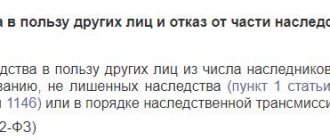The procedure for establishing the fact of acceptance of an inheritance in court will help you to become an owner from an heir.
No matter how the case is started, our inheritance lawyer will always be able to help you in the process of registering an inheritance after the death of your wife. He will advise you, draw up a statement of claim to establish the fact of acceptance of the inheritance and represent your interests.
When is it necessary to establish the fact of acceptance of an inheritance?
There are cases when an heir accepts the property of a deceased relative, for example, an apartment, and does not contact a notary within the six months established by law to accept the inheritance in writing. He lives in this apartment, is not late on rent, uses things that were in this house, and may have made repairs. In fact, he accepted the inheritance, but did not record it on paper, the deadline for entering into the inheritance was missed, and now this fact can be challenged and the property can be sued. Most often, there are other heirs who begin the inheritance conflict.
To eliminate this problem, it is necessary to prove and establish the fact of acceptance of the inheritance through the court, even after six months.
Cases when the establishment of the fact of acceptance of inheritance is recognized:
- If the heir takes possession of the property and begins to manage and use it as his own
- If it protects this property from attacks by third parties and harmful factors from nature (restoration and repair)
- If he maintains inherited property and spends his money on it (current utility bills, etc.)
- If the heir pays off the debts of the testator
The heir must prove all these facts in court, then he will receive a court decision establishing the fact of acceptance of the inheritance. Litigation, as a rule, lasts two to three months, unless complicated by additional claims in the form of recognition of family relationships or the issue of inheritance by dependents (see the link for more details).
If you only need to recognize that the inheritance has been accepted, then a court decision will be enough to notarize your right. But it is better to immediately, in the same process, recognize the ownership of the goods received, so that later you do not return to this, but immediately go to register your ownership rights with the registration authority.
ATTENTION : watch the video with advice from a lawyer on restoring the deadline for accepting an inheritance, its actual acceptance, ask questions in the comments to the video and do not forget to subscribe to our YouTube channel :
How to divide the inheritance? Who can be recognized as an unworthy heir and deprived of a share? What are the ex-spouses of the deceased entitled to? Who and how should pay off the debts of the deceased? Who has the right to an obligatory share in the inheritance? These and many other questions arise when it’s time to figure out what and to whom the deceased left in this world.
Unfortunately, disputes over inheritance reveal the darkest sides of human nature. Relatives, who have not remembered their “harmful” uncle for years, suddenly begin to fight in court for his money, apartment, and country house. The uncertainty of laws and judicial practice often played into the hands of such citizens. The practice of applying legislation on inheritance law has shown that the provisions of the Civil Code of Russia need improvements, the absence of which is today compensated by judicial interpretation. On May 29, 2012, the Plenum of the Supreme Court of the Russian Federation in its resolution clarified many issues related to inheritance.
Let's look at some of them:
Few people know that the inheritance includes not only property, but also the debts of the testator.
The Plenum of the Supreme Court of the Russian Federation explained in detail the concept and limits of inherited debts. All heirs who accepted the inheritance are responsible for the debts of the testator. Those who refuse to accept the inheritance are not liable for the debts of the testator. The death of the debtor is not a circumstance entailing early fulfillment of his obligations by the heirs. For example, the heir of the debtor under a loan agreement is obliged to repay the principal debt and interest on time and in the manner prescribed by the agreement. The bank has no right to demand early repayment of debt from heirs. The composition of the inheritance opened with the death of the testator who was married includes his personal property, as well as his share in the property of the spouses acquired by them during the marriage, regardless of whether it was acquired in the name of which of the spouses or in the name of whom or by whom or which of the spouses contributed the funds, unless otherwise provided by the marriage contract. It must be borne in mind that the terms of the marriage contract, which establishes the contractual regime of the property of the spouses only in the event of divorce, are not taken into account when determining the composition of the inheritance. From the date of opening of the inheritance, the inherited property comes into the shared ownership of the heirs who accepted the inheritance, with the exception of cases when the inheritance passed to the only heir by law or to the heirs under a will, in which the testator indicated specific property intended for each of them. Inherited property that has come into the shared ownership of the heirs can be divided between them by concluding an agreement on the division of the inheritance. The conclusion of an agreement on the division of an inheritance, which includes real estate, is permitted only after the relevant heirs have received a certificate of the right to inheritance. The law defines the circle of heirs who have a preferential right to receive, on account of their share, an indivisible property included in the inheritance, a living space, the division of which in kind is impossible.
The Plenum of the Supreme Court of the Russian Federation recently explained in detail the grounds and procedure for recognizing a citizen as an unworthy heir and removing him from inheritance. A will can be challenged only after the opening of the inheritance (that is, after the death of the testator) on the grounds provided by law. Certain violations of the procedure for drawing up a will, its signing or certification, for example, the absence or incorrect indication of the time and place of execution of the will, corrections and clerical errors, cannot serve as a basis for the invalidity of a will, if the court has determined that they do not affect the understanding of the will of the testator.
So, the legislator and judicial enforcers continue to actively discuss issues related to inheritance and everything related to it. This is, of course, due to the huge number of lawsuits related to inheritance legal relations.
The procedure for establishing the fact of accepting an inheritance
To establish in court the fact of acceptance of an inheritance, follow these steps:
- Prepare an application to the court to establish the relevant fact. ATTENTION: if there is a dispute about the right, the court will leave the application without consideration.
- Apply to the court at your place of residence.
- Take part in the court hearing, justifying your application.
- Wait for the court's decision.
- If the court refuses to satisfy your application, appeal it to a higher court.
Disputes regarding inheritance cases in court
Despite the efforts taken by the state to reduce the burden on the courts and the spread of pre-trial methods for the peaceful resolution of conflicts, judicial statistics, on the contrary, only indicate an increase in the number of inheritance disputes in the courts. This is due, firstly, to the authority of the state body, and secondly, to the fact that questions about establishing legally significant facts are resolved only by the court.
When applying to the court, the applicant needs to justify his right to the inherited property, therefore, when drawing up a statement of claim, all the constituent elements must be observed. The claim includes the following main parts:
- introductory _ The “header” of the document indicates the name of the court, the price of the claim, information about the plaintiff, testator and other participants in the process. The peculiarity of inheritance cases, in contrast to other categories of civil cases, is that the court involves as co-defendants all persons entitled to the inherited property, regardless of the indication of these persons by the plaintiff in the submitted application;
- descriptive _ This part of the application indicates the grounds for inheritance - family ties, will, and also describes all the circumstances that led to the application to the court;
- pleading . In this part, a request is made to the court to make a specific decision on the submitted application.
At the end of the claim, documents are attached confirming the plaintiff’s correctness when applying to the court.
USEFUL : follow the link to read our proposal for filing a claim in court within 24 hours, and also watch the video
How to draw up an application to establish the fact of acceptance of an inheritance?
What you must indicate when submitting an application to establish the fact of acceptance of the inheritance to the court and what evidence you must present:
- The fact that the inheritance is open. Proof can be the death certificate of the testator.
- Description of the property transferred to you (money, real estate, car, etc.). This information may be specified in the will or specified separately.
- Evidence that you have accepted the inheritance. Here you can present receipts for payments for housing, taxes, and insurance paid by you. In addition, confirmation of two witnesses will be required.
- Proof that you are the heir. It is necessary to confirm the fact of relationship (more details about establishing the fact of relationship with the deceased by reference). This could be a birth certificate, marriage certificate, or marks in a passport. If there is no such evidence, it will need to be established during the trial. If you are not a relative, then you are an interested party who is considered a potential heir.
- Jurisdiction of cases on establishing the fact of inheritance. Declaring only a requirement to establish the fact of acceptance of the inheritance, the applicant submits an application to the district court at his place of residence.
- Other important circumstances.
IMPORTANT: the purpose of going to court is to establish the legal fact of acceptance of the inheritance. It is necessary to formalize inheritance rights; for more information on how to file a claim in court, see the video
Legal services for heirs
Inheritance law contains many nuances, so cases involving such disputes are of increased complexity. If you would like to receive professional legal support in this matter, Prime Legal lawyers will be happy to help you. We have many years of experience in inheritance disputes, therefore, if there are legal grounds, we will definitely achieve a positive settlement of the inheritance dispute for you.
- Oral and written consultations on property inheritance cases. We will provide comprehensive information about your rights, place in the queue of applicants, the procedure for accepting an inheritance or refusing an inheritance if it is burdened with unsustainable debts.
- Recommendations for the most effective model of behavior in your inheritance dispute.
- Preparation of all necessary documents.
- Collection of evidence.
- Filing a claim in court
- Seizure of inherited property in the presence of a legal dispute.
- Travel to court hearings.
- Obtaining a court decision that has entered into legal force.
Limitation period for establishing the fact of acceptance of inheritance
A person can apply to establish a fact within the general limitation period, which is 3 years, BUT you should not wait for this period; you still need to resolve issues related to inheritance in a timely manner.
It should be noted that the court will refuse to satisfy the application due to the expiration of the statute of limitations only if such a request is filed by any of the parties involved.
Theoretically, such a request can only be made in a lawsuit when there is a dispute, although it cannot be ruled out that any interested person can also make such a statement when considering a case in a special proceeding.
How to challenge the actual acceptance of an inheritance?
You can state your objections to the actual acceptance of an inheritance by one person or another within the framework of a case to establish the fact of acceptance of an inheritance; in this case, the court will leave the application without consideration, and the person (plaintiff) will be able to file a claim in court.
As part of the consideration of the claim, the objector must refute the plaintiff’s arguments about the actual acceptance of the inheritance. For example, if the plaintiff claims that he used the inherited property, thereby accepting the inheritance, in this case the defendant must prove that the plaintiff did not use the inherited property, including through testimony. Or maybe the plaintiff was abroad altogether; in this case, you need to provide the relevant supporting documents or apply to the court with a petition to send the necessary requests to obtain information.
Types of inheritance disputes
- Inheritance disputes under the law . If the deceased did not leave a will, inheritance disputes are resolved in accordance with current legislation (Articles 1141-1145 of the Civil Code of the Russian Federation). This article sets a priority for each category of applicants. So, first the court considers the inheritance cases of the first-line applicants. These include close relatives (children, parents, spouse). If the deceased citizen does not have living relatives of the first stage, the court considers the inheritance cases of the applicants of the second stage (brothers and sisters, grandparents, nephews and nieces). And so on - there are only seven queues (at the end of the list are the stepmother, stepfather, as well as stepsons and stepdaughters). Disputes in inheritance cases within each queue are resolved by providing equal shares to each applicant.
- According to the will. By making a will, a citizen often protects his relatives from inheritance disputes. However, only if it was drawn up legally and does not infringe on anyone’s legitimate interests. Otherwise, in the process of consideration in probate court, the will may be declared invalid. For example, if the deceased citizen did not take into account in the document the legal right of the spouse to half of the jointly acquired property.
- Inheritance disputes in cases involving the presence of several wills. In this situation, applicants try to invalidate in court a will drawn up later, since in this case the earlier document will come into force.
- A dispute in inheritance cases concerning the determination of the unworthiness of a particular applicant . In this case, evidence of illegal actions of one of the interested parties is presented to the court.
- Category of cases involving inheritance disputes between applicants and the state. The state may also be an interested party in obtaining a share of ownership. In this case, the parties are exempt from paying state fees, and the state financial authority is declared a party to the case.
- Proving the relationship of the applicant and the deceased citizen is also a subtype of inheritance dispute.
Lawyer for establishing the fact of acceptance of inheritance in Yekaterinburg
As we see, not everyone is able to prove the establishment of the fact of acceptance of an inheritance on their own due to the complexity of the procedure. The main problem is to collect and analyze evidence and correctly compose a statement. It is also important to properly conduct the case directly in court.
The issues of proving the actual acceptance of an inheritance and challenging them are quite acute, so sometimes it is necessary to correctly collect the evidence base, which a competent lawyer can always help with.
To avoid mistakes, it is best to contact our inheritance lawyer in Yekaterinburg, who will monitor the correctness of the legal process to protect your inheritance rights. Start acting right now and call us - a consultation on inheritance will help you understand your problem and choose the most effective way to solve it.









